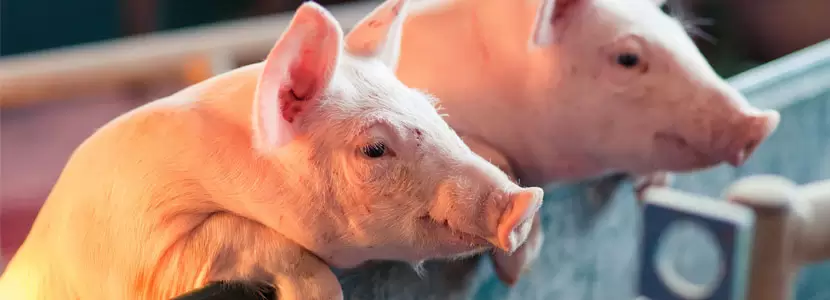Raw materials for pig feed manufacturing
The main ingredients(raw materials) that make up the diets for pigs are corn as the majority energy source, the by-products of the extraction of soybean oil (flour, expeller and pellets) as a protein source and vegetable oils (soybean oil) as energy concentrates in diets that require it.
Energy Raw materials
Corn is the most accessible grain in Argentina, although due to different circumstances of price, geographical region and availability, sorghum, wheat, oats and barley are also used in various formulations.
These cereals are important ingredients, since they occupy a high percentage of inclusion within pig diets; the main characteristic is its high energy value, provided mainly by starch and fat, presenting differences regarding its composition between the different crops.
Some of them have limitations in their use due to the lack or low presence of digestive enzymes in animals that hinder the breaking of chemical bonds so that nutrients are released, being advisable the use of exogenous enzymes (β-glucanases, xylanases, proteases, phytases) for a better use of them.
Corn is characterized by its high energy value, good palatability and low presence of anti-nutritional factors; the level of inclusion within diets (50 to 70%) significantly influences the quality of it, providing 63% of metabolizable energy and 25% of protein in fattening diets.
Rostagno points out that damaged grains have worse nutritional value compared to normal grain due to changes in their chemical composition, with reduced bioavailability of some nutrients, presence of anti-nutritional factors and the proliferation of fungi with or without mycotoxin production.
Therefore, analyzing the type of grain we use in our formulations is important, since broken grains have 90 Kcal of Metabolizable Energy / Kg less than whole grains (Dale, 1994),
It is also important to evaluate the storage conditions (temperature, humidity, actions of fungi, insects) since if these are inadequate, they can reduce from 5 to 25% the metabolizable energy of corn (Krabbe, 1995).
Fats of animal origin and derived from oilseeds are widely used in animal nutrition. Soybeans and sunflowers are the most important oilseed crops in our country, the first being the one with the highest growth and volume, placing Argentina among the main exporters worldwide.
The industry accompanied this growth, so soybean oil is an input available in pig-producing areas. The oil is obtained from the pressing and or solvent extraction (Hexane) of the soybean bean.
The oil obtained contains 99.6% fat and a significant amount of linoleic acid (52.57%) (Rostagno, 2011).
The inclusion in the diets of both fattening and breeding, allows to achieve desirable energy levels in particular situations, such as:
- Animals with low consumption due to environmental conditions
- When you want to reduce feed conversion
- Lactating females of high milk production and low consumption, etc.
It is important to control the quality of the oil to be used, since any alteration influences and harms the performance of the animals.
Controlling acidity (acidity index) determines the content of free fatty acids, being a measure of oil deterioration; and the peroxide index, which measures the oxidative rancidity of the oil, which involves chemical transformations that change organoleptic characteristics.
Keep up to date with our newsletters
Receive the magazine for free in digital version REGISTRATION ACCESS
YOUR ACCOUNT LOGIN Lost your password?
